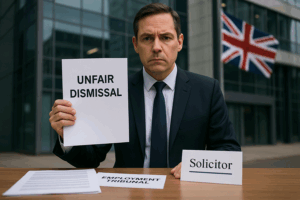Your legal rights under UK employment law

One day you have a desk;the next, a cardboard box and a hurried goodbye. But was that sudden exit actually lawful? In the UK, unfair dismissal occurs when an employer fails to follow fair procedure or lacks a valid reason for terminating your contract, as defined by the Employment Rights Act 1996. Too often, rights are ignored in silence. Before you accept what feels wrong, seek help from unfair dismissal solicitors who specialise in employment law and can help you challenge your dismissal and fight for the compensation you deserve.

Key Takeaway: What rights does UK employment law actually guarantee you when dealing with your employer?
Understanding these rights is the first step to ensuring they’re respected. Read on to learn the essentials.
What are the key laws protecting your rights against dismissal in the UK?
Protection for employees against dismissal in the UK primarily rests on two complementary pillars: a mandatory legal framework set out by the Employment Rights Act 1996 (ERA), and practical recommendations from the ACAS Code of Practice.
Employment Rights Act 1996: The fundamental legal framework
The Employment Rights Act 1996 (also known as the unfair dismissal act 1996) is the main legislation governing dismissals. It specifically defines:
- Valid reasons for dismissal, such as gross misconduct, capability issues, redundancy, statutory restriction, or some other substantial reason.
- The employer’s obligation to follow a fair procedure, including conducting a reasonable investigation, informing the employee of concerns, allowing them to respond, and providing the right to be heard.
- The employee’s rights to notice and clear notification of dismissal.
- The legal time limits for challenging a dismissal, generally three months minus one day from the date of termination;
This Act forms the legal foundation protecting employees against unfair dismissals and outlines how challenges should be pursued.
ACAS Code of Practice: Recommended guidance for employers
The unfair dismissal ACAS Code of Practice on Disciplinary and Grievance Procedures complements the legal framework by providing practical recommendations on handling dismissals. It emphasises:
- Clearly informing the employee of the concerns and reasons for potential dismissal.
- Conducting proper investigations before taking disciplinary action.
- Holding disciplinary meetings where the employee can present their case.
- Allowing the employee to be accompanied by a colleague or trade union representative.
- Providing the right to appeal the decision.
- Encouraging early resolution through discussion and mediation with unfair dismissal ACAS services.
While not legally binding, failure to follow the ACAS Code can result in tribunal awards being adjusted by up to 25%.
Other relevant laws and principles
In addition to the ERA and ACAS Code, other legislation provide further protection:
- Equality Act 2010: Prohibits discrimination based on protected characteristics including age, disability, gender reassignment, marriage and civil partnership, pregnancy and maternity, race, religion or belief, sex, and sexual orientation. Dismissals based on such grounds are automatically unfair.
- Trade Union and Labour Relations (Consolidation) Act 1992: Protects against dismissal for trade union membership or activities.
- Public Interest Disclosure Act 1998: Protects whistleblowers from dismissal for making protected disclosures.
- Contractual obligations: Employment contracts and company policies may provide additional protections beyond statutory minimums.
What is unfair dismissal?
A dismissal is considered unfair dismissal UK when it fails to meet the legal requirements for fairness. According to unfair dismissal law and the unfair dismissal act 1996, a dismissal may be deemed unfair if:
- It lacks a potentially fair reason: The employer cannot demonstrate that the dismissal was for conduct, capability, redundancy, statutory restriction, or some other substantial reason
- The procedure was flawed: The employer failed to follow a reasonable process, such as not conducting proper investigations, failing to hold disciplinary meetings, or denying the right to appeal
- It falls outside the range of reasonable responses: Even with a fair reason and procedure, the dismissal may still be unfair if no reasonable employer would have dismissed in those circumstances
- It is automatically unfair: Dismissals for certain prohibited reasons such as pregnancy, trade union activities, making protected disclosures, or exercising statutory rights are automatically unfair regardless of length of service
What are the employer’s obligations in case of dismissal?
An employer must comply with several legal obligations before, during, and after a dismissal to ensure the process is fair and lawful.
Substantive fairness requires that the dismissal is based on one of the potentially fair reasons recognised by law: conduct, capability, redundancy, statutory restriction, or some other substantial reason..
Procedural fairness requires the employer to follow a reasonable process, which includes:
- Conducting a proper investigation where appropriate.
- Clearly informing the employee of the allegations or concerns.
- Allowing the employee reasonable opportunity to respond.
- Holding a disciplinary hearing where the employee can present their case.
- Allowing the employee to be accompanied by a colleague or trade union representative.
- Considering the employee’s response and any mitigating circumstances.
- Providing written confirmation of the decision with clear reasons.
- Offering the right to appeal.
The employer must also respect contractual and statutory notice periods or provide payment in lieu of notice where appropriate.
What are your rights in case of unfair dismissal?
When facing dismissal, understanding your rights is essential for effective action . UK law strictly regulates the claims process, mandatory early conciliation, and available remedies.
Right to claim
If you believe you have been you’ve been unfairly dismissed, you have a strict deadline of three months minus one day from the effective date of termination to present a claim to the Employment Tribunal. The tribunal will assess whether the dismissal was fair and determine appropriate remedies.
The role of unfair dismissal ACAS Early Conciliation)
Before presenting a tribunal claim, you must contact ACAS for early conciliation. This free service attempts to resolve disputes without the need for tribunal proceedings. The conciliation period can extend your tribunal deadline, and failure to engage with early conciliation will generally prevent you from bringing a claim.
Remedies available
If successful, you may be entitled to:
- Reinstatement: Returning to your original job.
- Re-engagement : Employment in a comparable role.
- Compensation: Consisting of a basic award (calculated using age, length of service, and weekly pay) and a compensatory award for actual losses.
Compensation is subject to the unfair dismissal legal limit, which is updated annually. Additional awards may apply where employers fail to comply with tribunal orders.
Do I need an unfair dismissal solicitor?
While legal representation isn’t mandatory, unfair dismissal lawyers and unfair dismissal solicitors can provide valuable assistance by:
- Assessing your case : Evaluating whether your dismissal was potentially unfair and the strength of your claim.
- Providing unfair dismissal legal advice: Ensuring you meet all deadlines and procedural requirements.
- Gathering evidence: Helping compile documentation and witness statements to support your case.
- Representation: Acting on your behalf in early conciliation, tribunal proceedings, and settlement negotiations.
- Strategic guidance: Advising on the most appropriate course of action and likely outcomes.
An unfair dismissal solicitor or unfair dismissal lawyer who understands the complexities of tribunal procedure can significantly improve your prospects of success.
FAQs
Can I be dismissed during a probation period? Yes, but employees with less than two years’ service can still claim automatically unfair dismissal for prohibited reasons, and employers must still act reasonably.
What if my employer refuses to provide written reasons for dismissal? Employees with at least two years’ service have the right to request written reasons for dismissal. Failure to provide them can be used as evidence in tribunal proceedings.
Can I challenge a redundancy dismissal? Yes, if the redundancy is not genuine, the selection process was unfair, or the employer failed to follow proper consultation procedures or consider suitable alternative employment.
Enforcing your rights in cases of unfair dismissal requires both knowledge and strategic approach. Understanding the legal framework empowers you to make informed decisions about challenging unfair treatment.
Don’t let wrongful dismissal go unchallenged!
Disscover your legal rights and connect with Qredible’s network of expert employment solicitors who can fight for the compensation you deserve.
KEY TAKEAWAYS
- The deadline to challenge unfair dismissal is three months minus one day from termination.
- ACAS early conciliation is mandatory before tribunal proceedings.
- Employers must demonstrate both a fair reason and fair procedure.
- Compensation is subject to the unfair dismissal legal limit updated annually.
- Legal advice can significantly improve your prospects of success.
Articles Sources
- legislation.gov.uk - https://www.legislation.gov.uk/ukpga/1996/18/contents
- gov.uk - https://www.gov.uk/employment-contracts-and-conditions/employee-rights
- acas.org.uk - https://www.acas.org.uk/unfair-dismissal
- citizensadvice.org.uk - https://www.citizensadvice.org.uk/work/leaving-a-job/dismissals/unfair-dismissal/
- acas.org.uk - https://www.acas.org.uk/acas-code-of-practice-on-disciplinary-and-grievance-procedures
- legislation.gov.uk - https://www.legislation.gov.uk/ukpga/2010/15/contents
Do you need a solicitor?
Find a solicitor on Qredible in just a few easy steps

















